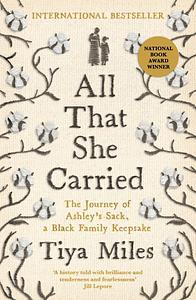You need to sign in or sign up before continuing.
Take a photo of a barcode or cover
652 reviews for:
All That She Carried: The Journey of Ashley's Sack, a Black Family Keepsake
Tiya Miles
652 reviews for:
All That She Carried: The Journey of Ashley's Sack, a Black Family Keepsake
Tiya Miles
This book is wonderfully researched and definitely an interesting topic. I feel like I learned quite a bit, too. But It is so research heavy and for me that definitely takes away from rose, Ashley and Ruth’s stories and made it difficult to read. I think it just wasn’t what I was expecting it to be.
This book made history as a field of study, the telling of history, the complexity of telling history, and an overview of Black women's experiences being enslaved in the US very accessible! The framework (taking one historical artifact as a jumping off point for many themes of Black women's experiences with slavery) was excellent. The emphasis on motherhood and enslaved Black mothers' connections with their children was especially moving. Much of the history shared here was new for me - but I think the book would still be enjoyable for you if you are already quite knowledgeable, thanks to the way the book works (taking one historical artifact and exploring the many themes it envokes, from textiles/embroidery as resistance + as important historical objects especially for studies of slavery, to the spiritual power of locks of hair).
I also really appreciated the book's many insights on the process of being a historian of slavery, and how complex doing this work is. In a good way, this angle reminded me of the graphic novel "Wake." Because I read this, I feel more confident and interested in picking up another book from a historian - and I think this book also gives lay readers like me a better foundation to appreciate the massive challenges of curating history exhibits about anything and, especially, about the lives of unfree people (and this was a new term for me, too!).
I sometimes (rarely) felt like the extrapolation/exploration of the many rabbit holes the artifact offered got a bit windy/long for me (e.g., the chapter on pecans), but this may just be my own attention span/a personal failing in me as an audiobook listener. I also wasn't always sure about language like "surely, this must have meant..." in parts that were taking seperate accounts and trying to attach those findings to the stories of other people. But, I appreciate that this is much of the work of historians.
Listened to this on audiobook; good narration!
I also really appreciated the book's many insights on the process of being a historian of slavery, and how complex doing this work is. In a good way, this angle reminded me of the graphic novel "Wake." Because I read this, I feel more confident and interested in picking up another book from a historian - and I think this book also gives lay readers like me a better foundation to appreciate the massive challenges of curating history exhibits about anything and, especially, about the lives of unfree people (and this was a new term for me, too!).
I sometimes (rarely) felt like the extrapolation/exploration of the many rabbit holes the artifact offered got a bit windy/long for me (e.g., the chapter on pecans), but this may just be my own attention span/a personal failing in me as an audiobook listener. I also wasn't always sure about language like "surely, this must have meant..." in parts that were taking seperate accounts and trying to attach those findings to the stories of other people. But, I appreciate that this is much of the work of historians.
Listened to this on audiobook; good narration!
dark
emotional
informative
inspiring
reflective
sad
fast-paced
Best book I’ve ever read. Miles researches, writes and etches an imprint on the hearts of all readers. I can’t think of a better way to tell history. It’s personal, it’s intellectual and it shows the beautiful bonds between women.
Really interesting the broad range the author covers from Ashley’s Sack. From slavery, to food, to cloth, to patriarchy and current events.
A masterpiece of material culture research. Using one family's unique heirloom from enslaved ancestors, Miles guides readers through the history of slavery in Charleston, South Carolina, the traumas and survival strategies of enslaved women, textile production, the Great Migration, and even pecan cultivation. The full story is a poignant tribute to and spiritual reflection on the power of maternal love. Miles' storytelling is extensively footnoted but easily approachable for any general reader.
A lot of slavery history, a bit repetitive in its approach, stretching the sacs importance to the book
emotional
informative
inspiring
reflective
sad
slow-paced
This book takes a simple, embroidered, cloth sack and weaves it into the beautiful tapestry of historical record it embodies. Highly recommend!
This book is rich with detail and love for its subject, bringing alive stories that are hard to find and important to know. My only issue with the book is that, to me, it reads like an academic thesis. It's hard to put my finger on exactly why this is, although it may be the way that suppositions are stated. Still, certainly worth the read.
At this point, this is one of a handful of books that I did not finish. I so want to finish it someday. But the writing style is so difficult for me to move through. I lose concentration each time I start, and that is highly unusual for me.
